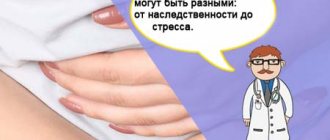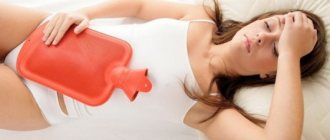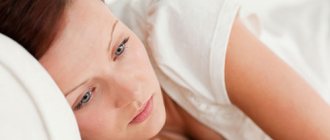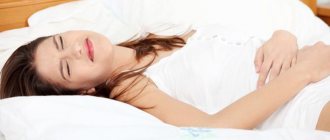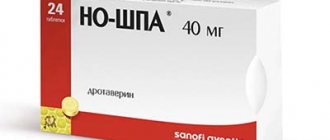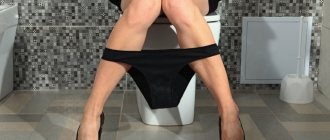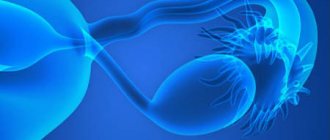Most often, women during the regulative period suffer from pain in the lower abdomen and lumbar region. Much less often, representatives of the fairer sex encounter a rather atypical symptom that accompanies menstruation - pain in the anus. Their causes can be gynecological, gastrointestinal diseases and even diseases of the nervous system.
There are a lot of women prone to this pain syndrome, but for some reason they do not pay due attention to it. If, during regular menstruation, the pain radiates strongly in the anus, then it is no longer possible to do without the help of a specialist. Take some time for yourself and if you have such symptoms, undergo an examination, which will be prescribed by your doctor.
Main reasons
Inside the anus there are many nerve endings and vessels, which, under certain factors, are prone to inflammation and the formation of nodes. It is during menstruation that blood circulation in the pelvic organs increases, which leads to favorable conditions for the life of various pathogenic microorganisms.
Sedentary work, lack of an active lifestyle, hard physical labor and heavy lifting can cause the formation of intestinal pathology and pain in it.
If the pain is of a shooting nature, you need to determine the cause of its occurrence as soon as possible and consult a doctor for this. Any disease without treatment goes from acute to chronic, which complicates the situation.
Despite the fact that the pain appeared during menstruation, it can be associated with various infectious processes in the rectum, neoplasms or fissures, and not just with diseases of the female genital organs.
Factors
During menstruation, unpleasant and burning pain in the anus is a very unpleasant symptom. There are several factors that can provoke uncharacteristic pain. But not all of them are related to the renewal of the uterine mucosa and other processes that occur during normal menstruation. Here you need to look at the presence of other symptoms that bother a woman both during menstruation and in its absence.
- Pain occurs in the anus when there are intestinal problems. The reason may be:
- coccydynia (tailbone injury);
- haemorrhoids;
- presence of anal fissure;
- paraproctitis (inflammatory purulent process);
- inflammation of blind pockets.
Gynecological diseases
If the anus hurts during menstruation, the likelihood of gynecological diseases is high.
Algomenorrhea
A common menstrual cycle disorder is expressed by cramping or nagging pain in the abdomen, lower back and rectum. General weakness, headache, nausea, and stool disturbances often accompany algodismenorrhea.
The disease can be primary or secondary due to other pathological processes in the body. Among the causes of this pathology are endometriosis, endometritis, abnormal position of the uterus, bending of the cervix and other diseases.
Fibroids
A benign formation in the uterus is called fibroids and often causes pain in the rectum, stomach, and bleeding. The tumor most often occurs in women after 35 years of age. The degree of pain and its location depend on the size of the tumor. One of the characteristic symptoms of uterine fibroids is impaired menstruation. Causes of fibroids:
- artificial termination of pregnancy;
- incorrect choice of contraception;
- constant depression and stress;
- ovarian cysts;
- absence of childbirth and breastfeeding after 30 years.
Andexit
Inflammation of the uterine appendages quite often becomes the reason why the rectum hurts in women during menstruation. Other symptoms include a sharp increase in temperature, severe pain in the sacrum and lower abdomen, muscle pain, and increased sweating. The inflammatory process occurs due to the penetration of streptococci, E. coli, gonococci, the installation of an intrauterine device, and due to sexually transmitted diseases.
Endometriosis
A severe gynecological disease also causes pain in the anus. Endometrial cells grow and penetrate neighboring organs, which provokes pain during menstruation, when blood circulation in the pelvic organs increases.
The menstrual cycle is disrupted, and blood accumulates and is not excreted. A woman has spotting vaginal discharge that may not stop for a month.
Ectopic pregnancy
Pain in the lower abdomen, fever, and pain in the anus almost always accompany an ectopic pregnancy, which requires urgent medical attention.
Exacerbation during menstruation
Unpleasant pain in the anus during regular menstruation increases if there is even the slightest damage to the rectum. Most often it occurs when there is stagnation of blood. Ectopic pregnancy is also characterized by pain radiating to the anus.
On ordinary days, the presence of these pathologies is not clearly expressed. And with the onset of menstruation, all symptoms worsen several times, and often the pain radiates to the anus. So, fibroids put pressure on some organs; it can press into the intestines or anus.
Pain syndrome is caused not only by pathologies. Doctors have noticed that overeating during menstrual periods can result in chronic pain in the anus, which disappears as soon as a woman begins to eat in her usual way. It’s no secret that menstruation provokes and increases women’s cravings for sweets, since the body experiences stress during critical days. Therefore, it is very important to control your diet, not to overload your stomach and add more fruits and vegetables to your diet.
But all these recommendations should be voiced by the doctor himself after the examination. Only in this case can you be sure that they will be effective and help avoid complications.
How to relieve pain in the rectum
You cannot expect the pain to go away on its own, even if it is not too intense. For each disease, medical care is different.
- For proctitis, surgery is prescribed to eliminate the abscess, followed by antibiotic therapy.
- Cryptitis is first treated with rectal suppositories with chloramphenicol and propolis, and in the future surgery may be necessary.
- Coccingodynia can be eliminated using modern methods of physiotherapy. Sometimes a blockade with novocaine is used to relieve acute painful sensations.
- For hemorrhoids, Relief suppositories, various ointments with heparin, and venotonic preparations are effective.
- To heal cracks and relieve pain, use Ultraproct and Solcoseryl.
- Antibiotics and anti-inflammatory drugs are used to treat adnexitis.
- Endometriosis requires surgical treatment, but painkillers are prescribed to relieve pain. Among them are the drugs Novigan and Nurofen.
- To relieve pain from fibroids, take Ibuprofen and Naroxen.
- “No-shpa”, “Spazmalgon” will help relieve spasms and pain during algodismenorrhea.
Treatment
The anal canal contains a very large number of nerve endings. When they become inflamed, the body experiences terrible discomfort and suffers from illness.
In order to begin treatment, it is necessary to establish the cause that led to pain in the anus. There are different stages of the disease. Sometimes you can get by with ointment and suppositories, and sometimes only surgery is required. It is not recommended to self-medicate, since the ailments that affect this area are very serious. Only a doctor can determine the symptoms and prescribe treatment.
There are modern diagnostic methods that you should definitely use:
- A visit to a gynecologist to establish a diagnosis, examination in a gynecological chair.
- Ultrasound diagnostics of the pelvis and abdominal cavity.
- X-ray.
If an infection is suspected in the female body, general urine and blood tests may be prescribed. To exclude intestinal pathology from a number of diseases, it is worth using colonoscopy and sigmoidoscopy. It is necessary to take a stool test for the presence of bacteria.
For almost any pain in the abdominal area, anti-inflammatory and painkillers are prescribed. There may be surgical interventions:
- cryotherapy of nodes (liquid nitrogen is used);
- coagulation (cauterization with infrared waves);
- scleotherapy (a special agent is injected into inflammatory areas, which helps reduce inflammation after a few days).
It is possible to use several methods simultaneously, in several stages.
As for drug therapy, drugs based on natural ingredients (sea buckthorn oil, calendula extract, propolis) can be used for treatment. Ointments should be used for external hemorrhoids; for internal hemorrhoids, suppositories are suitable.
Prevention measures
General recommendations for the prevention of diseases of the pelvic organs boil down to the following rules:
- daily genital hygiene;
- proper nutrition;
- moderate physical activity;
- refusal to play sports until complete recovery;
- timely visit to the doctor.
If pain during menstruation radiates to the rectum, you should definitely visit a doctor. Such pain does not always mean problems with the digestive tract. They may be a sign of serious pathologies of the female genital organs that require urgent treatment. By paying attention to pain radiating to the rectum, you can stop the development of the pathological process.
httpss://youtu.be/riA076NsiH4?t=15s
It hurts to sit during menstruation
Most often, painful periods are primary dysmenorrhea, that is, unpleasant sensations do not arise due to illness, but on their own.
If you are healthy, but you are in pain, then prostaglandins are to blame for your discomfort - these are mediators that increase the sensitivity of pain receptors. They are produced in the lining of the uterus during menstruation.
Because of them, the uterus contracts in order to remove blood and endometrium faster.
Sometimes back pain is added to these sensations. Prostaglandins also influence the contraction of smooth muscles in the gastrointestinal tract, so these substances are responsible for nausea and diarrhea during menstruation.
https://www..com/watch?v=ytpressru
You were unlucky. No one can say for sure why some women have heavier periods than others. This is a feature of the body that needs to be dealt with.
What other reasons cause pain?
If the pain begins suddenly, then you need to examine the genitourinary system and organs that are located nearby. Perhaps the real cause of discomfort is diseases, such as:
- Endometriosis.
- Inflammation of the bladder (cystitis).
- Myomas, fibromas and other tumors.
- Inflammatory diseases in the pelvic organs.
- Intestinal diseases.
With painful periods, any of these diseases can be associated with increased production of prostaglandins. Therefore, if the pain becomes stronger than usual, lasts longer than three days, the cycle is disrupted, unusual discharge or pain during sex appears, consult a doctor about these symptoms.
Is it dangerous?
You need an examination by a gynecologist (at the same time, the doctor can take smears, including for hidden STIs), as well as an ultrasound examination of the pelvic organs.
This is enough to draw conclusions about health and treat either illness or dysmenorrhea.
If during the examination the doctor finds nothing, and the pain during menstruation is severe, does not go away with bleeding, and the prescribed treatment does not help, then an exploratory operation will be required to find or exclude endometriosis.
If pain during menstruation is not caused by diseases, then no. But this is not a reason to endure. Talk to your doctor and find painkillers that are right for you.
What pills can you use to save yourself?
First aid - non-steroidal anti-inflammatory drugs, NSAIDs. These are fairly safe painkillers, sold without a prescription and in a variety of combinations.
There is no point in immediately rushing for products with a complex composition. Regular ibuprofen may help. There are also stronger drugs - indomethacin, ketoprofen. All drugs have contraindications. Women who have stomach diseases need to be especially careful. To take NSAIDs in these cases, you need to consult a doctor who will select the drug.
But antispasmodics help with dysmenorrhea worse (if they help at all), because they do not affect the cause of the pain.
Will birth control pills help?
Hormonal oral contraceptives create an artificial menstrual cycle with its own hormonal background. At the same time, the endometrium becomes thinner so that a fertilized egg cannot attach to it. And since this layer is thinner, there are fewer prostaglandins in it. Therefore, birth control pills are often prescribed for painful periods.
If your doctor recommends pills, try to choose modern medications with minimal side effects and check if you have any contraindications.
Therapy is not limited to pills: hormonal IUDs or injections perform the same tasks.
How to treat, besides pills?
There are methods that help make it easier to endure pain during menstruation. Unfortunately, it is impossible to say for sure that they will help: everyone has their own reactions. Try everything one by one, focus on your own state and listen to the sensations.
- Warm. The best option is to crawl under the covers and sit with a mug of hot tea, you can even apply a heating pad to your lower abdomen, but this is not always possible. If you need to leave the house and do business, dress warmly. Choose clothes that don't create discomfort in the abdominal area: tight jeans and belts that cut into the body will last a few days. A warm shower works too.
- Sport. You need to play sports for prevention, and when it becomes difficult, do light exercises to relax your muscles and stretch.
- Acupuncture. There is no evidence that such alternative medicine works. But at least the procedures distract from the pain.
- Relaxing massage. It distracts from unpleasant sensations and is generally beneficial for the body and mind, which also needs to rest sometimes. Massage your abdomen, stroking it clockwise in the area where pain is felt.
- Comfortable position. If you can lie down, try to raise your legs higher or lie on your side with your knees bent.
- To give up smoking. You need to quit for good, and not just for those days when you feel pain.
- Vitamins and microelements. This is also not an absolutely reliable method, but it is possible that supplements with vitamins B6, B1, E, magnesium and calcium will help you.
Will the pain decrease after childbirth?
There is no guarantee that painful periods will go away after childbirth, despite the fact that many doctors for some reason recommend childbirth as a remedy for many gynecological problems.
https://www..com/watch?v=ytdevru
Some women notice that pain decreases with age and after childbirth, but not everyone can count on this. The pain may remain with you until menopause.
Source: https://roddom4ufa.ru/blog/bolno-sidet-mesyachnykh/
